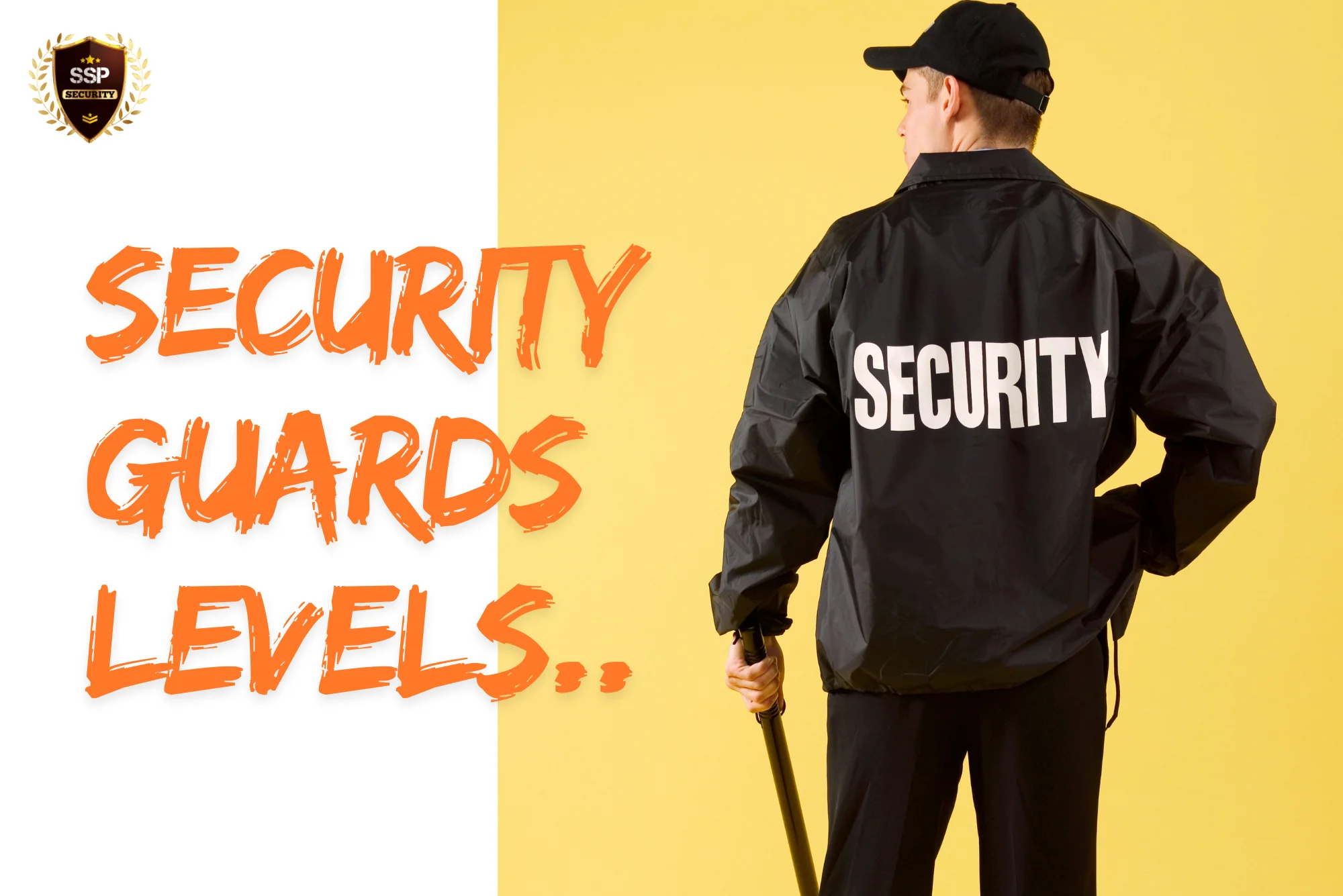Understanding the Levels of Security Guards in Australia
- SGS Updates
- October 25, 2025
- Hasham

Table of Contents
Introduction – Why knowing security guard levels matters
When you work as a security guard in Melbourne, you will come across many job titles, each with its own set of duties and skills. Security guards in Australia protect schools, hospitals, offices, public events and more, depending on their training and experience.
So, understanding the different levels of security guards helps workers plan their career path and aim for better pay. It also helps businesses hire the right guards for their specific needs. What we see in this particular post:
Overview of Guarding licensing and roles in Victoria
In Victoria the industry is regulated by Victoria Police via the Licensing & Regulation Division. (police.vic.gov.au).
You need both training (such as the CPP20218 Certificate II in Security Operations) and a licence to work as a guard. (aet.vic.edu.au)
Also the industry award (Security Services Industry Award 2010 / MA000016) defines classification levels from Level 1 up to Level 5. (Fair Work Awards). These levels show the guard’s training, responsibility, and pay rate.
So when we talk about “Level 1”, “Level 2”, we were referring to classification under the Award. You can read more about qualifications in our post on how to become a security guard in Australia.
Classification Levels of Security Guards in Australia
Level 1 Security Guard – The Beginner
Role: A Level 1 guard is an entry-level officer who works under supervision. They perform basic duties such as patrolling, guarding property, monitoring CCTV systems, and checking doors or access points.
According to the Award:
A Security Officer Level 1 “watch, guard or protect persons and/or premises where the complex use of computer technology is not required.”
How to achieve it:
- Be at least 18 years old and have working rights in Australia.
- Complete the Certificate II (CPP20218) training course.
- Obtain the individual security licence in Victoria.
- Typical pay: Under the Fair Work Awards the minimum hourly rate (ordinary hours) for Level 1 is about AUD $27.13.
- With night, weekend or public holiday penalties the rate rises significantly.
- In practice market rates in Melbourne for basic unarmed guard roles start around AUD $37-$40 per hour based on site and shift.
Lowest rank & position name: The lowest level is Level 1; typical job title is “Security Officer – Level 1” or simply “Security Guard”. Many of them later move into roles like static security guard or mobile patrol officer.
Level 2 Security Guard
Role: Works above Level 1. Has additional skills, may handle more complex tasks like responding to alarms, vehicle patrols, crowd control at events.
According to the Award: “A Level 2 Security Officer works from detailed instructions, coordinates tasks in a team or works independently under general supervision, and is responsible for the first response to security incidents.”
How to achieve it:
- You must hold the Certificate II (or equivalent) and have some experience at Level 1.
- Demonstrate competence in more complex tasks and possibly specialized training.
- Your employer may recognize you for higher classification under the Award.
- Typical pay: Hourly minimum rate under the Award is about AUD $27.91 ordinary hours.
- With penalties it increases (see table below).
- In the Melbourne market you may see wages around AUD $40-60 depending on level-2 officer duties.
Event companies and large gatherings often prefer Level 2 guards for their skills in public safety. Learn more in our guide on hiring event security services in Melbourne.
Level 3 Security Guard
Role: It is a Mid-level guard with higher responsibility. These officers can work with limited supervision; may monitor systems, handle complex sites, data input or building management.
Award says:
“A Level 3 Security Officer holds a Certificate III in Security Operations or an equivalent qualification. They use their skills and knowledge specific to their assigned location and work independently with limited supervision.”
How to achieve it:
- Hold Certificate III in Security Operations (or equivalent) for certain roles.
- Gain experience at Level 2 or similar duties.
- Demonstrate higher skills such as computer monitoring, building management systems.
- Typical pay: Award minimum ordinary hourly rate is around AUD $28.38.
Market salaries for experienced security guards in Melbourne with several years’ experience sit around AUD $60-70k per year. (Glassdoor)
Level 3 guards are often used in offices and corporate security setups, where professional behavior and communication matter most.
Level 4 Security Guard
Role: Senior guard with significant responsibility. Could work in a central monitoring station, coordinate other guards, use advanced security systems. From Award:
A Level 4 Security Officer works above and beyond Levels 1, 2, and 3. They may monitor, record, or input information, respond to security signals, and coordinate or oversee the activities of other security officers.
How to achieve it:
- Hold Certificate III and substantial experience in security operations.
- Can operate monitoring systems such as building management or central station.
- Demonstrate advanced interpersonal, computer skills and limited supervision.
- Typical pay: Award ordinary hourly rate is approx. AUD $28.86.) In real market this role would command more due to skill and responsibility (monitoring center, tech).
- You may see annual salaries in Melbourne for guard roles reaching AUD $70k+.
Many of our clients hire Level 4 guards for shopping center security, where coordination and quick decision-making are vital.
Level 5 Security Guard
Role: This is the highest classification. Level 5 guards may lead entire teams, manage rosters, and handle risk assessments. They are trusted with high-value sites or events. Award says:
A Level 5 Security Officer works above and beyond Levels 1, 2, 3, and 4. They may coordinate the duties of other security officers working as a team within a central control station.
How to achieve it:
- Reach the qualifications (Certificate III or better) and many years of experience.
- Demonstrate leadership, advanced skills, discretion, training others.
- Possibly hold supervisory role (team leader, shift supervisor) or specialized site.
- Typical pay: Award ordinary hourly rate approx. AUD $29.79. In the market senior roles may earn AUD $70k+ or higher depending on risk, site, shift, public holiday penalties.
These professionals are sometimes called Chief Security Officers or Commanders. They often coordinate services like mobile patrol security or manage multiple sites.
Guards Ranks and Supervisory Roles (Commander/Chief)
Although the Award uses “Level 1 to Level 5”, many companies use job titles such as Chief Security Officer, Security Supervisor, Team Leader, Commander, or Chief Guard. These are beyond the classification levels and typically are supervisory or management roles.
- The lowest rank is typically the Level 1 “Security Officer – Level 1”.
- A supervisor role (for example “Shift Supervisor” or “Team Leader”) may be classified as Level 5 + or in a separate supervisory allowance.
- A “Commander” or “Chief” may oversee multiple sites, coordinate large teams, report to management, and might be in managerial salary structures rather than pure guard‐classification.
When writing job descriptions you can link “Chief Security Guard” or “Security Supervisor” roles to your services such as [your link to supervisory guard service page].
Comparison Table of Different Security Levels
| Level | Job Title Example | Key Responsibilities | Minimum Hourly Rate* | Typical Market Pay |
| Level 1 | Security Officer – Level 1 | Routine guarding, simple CCTV, access control | AUD $27.13 ( | AUD $27-40/hr in Melbourne |
| Level 2 | Security Officer – Level 2 | Response to incidents, patrols, crowd control | ~ AUD $27.91 | AUD $40-60/hr depending on site |
| Level 3 | Security Officer – Level 3 | Building management systems, independent duties | ~ AUD $28.38 | AUD $60k-70k per annum |
| Level 4 | Security Officer – Level 4 | Monitoring centre, team coordination, advanced tech | ~ AUD $28.86) | Higher depending on shift/site |
| Level 5 | Security Officer – Level 5 | Team leader, complex coordination, high risk sites | AUD $29.79 | Senior roles may exceed AUD $70k+ |
*Note: Rates shown are base award minimums; actual pay will be higher for night shifts, weekends, public holidays and special duties.
Why Advancing Levels Matters for Your Career
Moving through levels means more responsibility, more training and more pay. If you stay at Level 1 you may be doing the same tasks for years.
But if you aim for Level 3-5 you open doors to supervisory roles, specialist sites (airports, high-risk, control rooms) and higher wages.
For businesses hiring guards, higher-level guards mean fewer risks, more professionalism and better value.
To understand how professional training shapes guard quality, check our blog on evolution of security guard training and certification in Australia.
How Our Company Can Help
As a leading security guards company in Melbourne, we provide trained and licensed guards for every level. Our team understands the Victorian Security Award standards and ensures the right classification for each job.
We offer:
- Professional guards for commercial sites, events, and high-risk areas (view our services)
- Licensed officers from Level 1 to Level 5
- 24/7 monitoring, patrols, and event security
Conclusion – Summary & Next Steps
You will often see classification levels from Level 1 to Level 5 for security guards. Each level builds on the last in skill, responsibility and pay. For a successful career or proper guarding service you must know these levels.
If you are looking to hire guards, ask about their license, classification and experience level. If you are a guard, set your path: start with Certificate II, aim for Certificate III, gain experience, and move up the levels.
Next step: If you need to hire security services or are exploring a career in security, contact us today and we will match you with the right level guard or guide your pathway.



